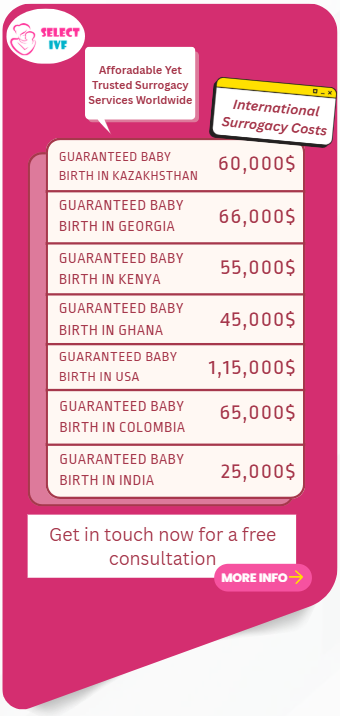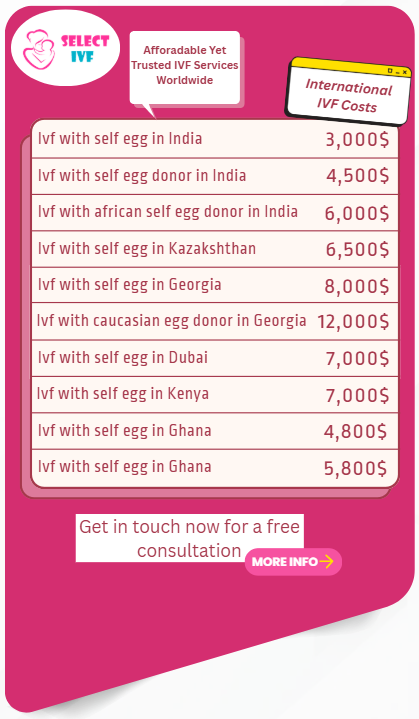In India, where surrogacy has been a hope for many couples struggling with infertility, a surrogacy ban would be devastating. Couples who have invested emotional energy and resources into surrogacy would face significant distress, feeling a deep sense of loss and grief for the potential child they may not be able to have.
The ban would also lead to financial strain, with couples losing their investment in surrogacy arrangements and potentially facing higher costs for alternative options like international surrogacy or adoption. This would likely increase stress and anxiety for couples dealing with infertility issues, putting a strain on their relationships.
However, it’s not like that surrogacy is completely banned in India. Only a few types are banned. Gestational and altruistic surrogacy is still available in India. So in this article, we will talk about the impact of Surrogacy Ban on intended parents and provide you with some other options that can help you to cure your infertility.
Why should you trust SELECT IVF for Surrogacy Ban?
- First-stage top counseling sessions
- Premium services and processes
- Highly competent specialists for Surrogacy Ban
- Sky-high surrogacy success rates in Delhi
- Contact us Email ID: info@selectivf.com
- Call us: +91 8447592299
What is surrogacy?
Surrogacy is defined as a fertility treatment that helps intended parents overcome their infertility. In surrogacy, intended couples are involved and a surrogate. She performed surrogacy as a substitute for the intended mother. She carries the baby on behalf of the intended mother. Basically, surrogacy is used when the intended parents are not able to conceive a pregnancy for more than 1 year.
Types of surrogacy
The types of surrogacy that are available in India are the following:
- Gestational surrogacy: It is one of the most used surrogacies in India that involves the egg from the intended mother or egg donor and sperm from the intended father or sperm donor, then combining the egg and sperm on the laboratory dish to create an embryo. The embryo is then implanted into the gestational mother’s uterus.
- Altruistic surrogacy: This is another surrogacy that is available in India. It allows the surrogate mother from the side of the intended couples and it doesn’t allow compensation to the surrogate mother.
What kind of Surrogacy Ban in India?
The types of surrogacy that are unavailable in India are the following:
- Traditional surrogacy: It’s the type of surrogacy which involves the surrogate’s egg and the intended father’s sperm for direct fertilization in the womb of a surrogate mother. This surrogacy is performed with the help of IUI techniques, that’s why the surrogate has a genetic relationship with the child. This traditional surrogacy is banned in India.
- Commercial surrogacy: It’s another surrogacy in India which is banned. It’s because this surrogacy does the exploitation of the surrogate mother as multiple poor women are in a world that is ready to become surrogates because of poverty and doctors or recognised fertility centres or intended couples exploit them in return for the small amount of money. This surrogacy allows compensation to the surrogate mother.
What Kind of Surrogacy is Allowed in India?
As per the Surrogacy (Regulation) Act, 2021, only altruistic surrogacy is allowed in India. Commercial surrogacy has been completely banned to protect the rights and dignity of surrogate mothers and prevent exploitation:
Altruistic Surrogacy: The Only Legal Form in India
Altruistic surrogacy means the surrogate mother offers to carry the child without taking any monetary compensation, except for the medical expenses and insurance coverage during the pregnancy. It is done purely out of love, compassion, or a close relationship with the intending couple (like a relative or friend).
Key features of legal surrogacy in India:
- Only Indian couples (heterosexual and legally married for at least 5 years) are allowed to opt for surrogacy.
- The intending couple must be medically proven to be infertile.
- The surrogate must be a married woman (25–35 years) with at least one biological child of her own.
- Surrogacy is allowed only once for a surrogate mother in her lifetime.
- No monetary reward or commercial arrangement is permitted.
Gestational surrogacy
Gestational surrogacy is a modern and widely used type of surrogacy in which the surrogate mother is not genetically related to the baby. Instead, the embryo is created using the egg and sperm of the intended parents (or donors) through IVF (In Vitro Fertilization) and then implanted into the surrogate’s uterus. The surrogate simply carries the pregnancy until delivery.
Legal Framework of Surrogacy in India
India has established a strict and ethical legal framework for surrogacy through two landmark laws: the Surrogacy (Regulation) Act, 2021 and the Assisted Reproductive Technology (Regulation) Act, 2021, both of which came into effect in 2022. According to these laws, only altruistic surrogacy is legally permitted in the country. This means the surrogate mother cannot receive any monetary compensation for carrying the child, except for her medical expenses and insurance coverage during pregnancy. Commercial surrogacy, which involves payment or profit-making through the surrogacy arrangement, is completely banned and punishable by law.
Under the legal provisions, only Indian heterosexual married couples are eligible for surrogacy. They must be married for at least five years, and medically certified as infertile. The female partner must be aged 23–50 years, and the male partner must be 26–55 years. They must also not have a surviving biological or adopted child, with limited exceptions. Surrogacy is not allowed for foreigners, NRIs, PIOs, same-sex couples, live-in partners, or single individuals.
For a woman to become a legal surrogate, she must be married, 25–35 years old, have at least one biological child, and must serve as a surrogate only once in her lifetime. Additionally, she must be a close relative of the intended couple and pass medical and psychological screenings.
The law also requires couples to obtain a certificate of essentiality and a certificate of eligibility from the appropriate authorities before proceeding. These measures aim to ensure transparency, protect all parties involved, and eliminate unethical practices such as exploitation or commercialization of the surrogacy process.

What’s the process of surrogacy?
The procedure of surrogacy step-by-step in India, in Select IVF, takes 11 to 18 months for both domestic and international patients. We have specialised plans for international patients and have personalised options for domestic patients.
First, let’s talk about our domestic and international patients’ procedure of surrogacy step-by-step in the form of a table for your easy understanding:
| The procedure of surrogacy for domestic patients | Domestic patients for surrogacy in India | The procedure of surrogacy for International Patients | International patients for surrogacy in India |
| Consultation | Discussion of causes of infertility, the success rate of surrogacy, cost, and other essential things with domestic patients. | Contact a clinic & get a consultation | Reach out to a reputable clinic in India such as Select IVF. Get a consultation by phone to discuss your medical history and suitable treatment options. |
| Ovarian stimulation | Providing hormonal injections to women or egg donors to produce eggs | Initial consultation | Schedule an initial consultation with the surrogacy specialist to discuss essential things such as the medical history, costs, success rate, etc. |
| Egg retrieval | Eggs are harvested from the uterus of the woman using a catheter | Application for a medical visa | Get a medical visa from India, which typically requires documentation. |
| Sperm collection | Sperms are gathered from the male partner | Testing | Tests advised by fertility doctors such as blood tests, semen analysis, and other procedures. |
| Fertilization | Eggs and sperm are combined together on a laboratory dish to form an embryo | Ovarian stimulation | Providing hormonal injections to women or egg donors to produce eggs |
| Embryo transfer | The embryo formed through fertilisation is placed into the uterus of the woman | Egg retrieval | Eggs are harvested from the uterus of the woman using a catheter |
| Pregnancy check | After 12 days, a blood test is performed to check the results of the embryo transfer | Sperm collection and fertilisation | Sperms are gathered from the male partner, & Eggs and sperm are combined together in a laboratory dish to form an embryo |
| Embryo transfer & pregnancy check | The embryo formed through fertilization is placed into the uterus of the woman, & After 12 days, a blood test is performed to check the results of the embryo transfer. |
The rules and regulations regarding surrogacy
It is important to follow the rules and regulation regarding surrogacy because it helps you to make your surrogacy journey smooth with out any complications. It’s rules and regulation include the following:
- The couple should be married and indian citizen.
- Their ages must range from 23 to 50 years for female and 26 to 55 years for males.
- The age of the single women which is widows and divorcees age ranges between 35 to 45 years old.
- In India, altruistic surrogacy and gestational surrogacy are allowed.
- Commercial and traditional surrogacies are not allowed because of exploitation of surrogate mothers and issue in custody of child.
- The age of the surrogate mother for surrogacy must be between 25 to 35 years.
Impact of surrogacy ban on intended parents
A surrogacy ban can have significant emotional, financial, and legal implications for intended parents. Here’s how:
Emotional Impact
Distress and disappointment: Intended parents may experience emotional turmoil, feeling that their dream of having a child is being delayed or denied.
Uncertainty: The ban can create uncertainty about their future and the well-being of their potential child.
Financial Impact
Loss of investment: Intended parents may lose money invested in surrogacy arrangements, such as agency fees, medical expenses, and travel costs.
Increased costs: They may need to seek alternative, potentially more expensive options, like international surrogacy or adoption.
Legal Impact
Parental rights: A ban can affect intended parents’ ability to secure parental rights, potentially leaving them without legal recourse.
International surrogacy: If surrogacy is banned in their home country, intended parents may seek international options, which can lead to additional legal complexities
Impact on Surrogacy Process
Limited options: A ban can limit the pool of potential surrogates, making it more challenging for intended parents to find a suitable match.
Disruption of arrangements: Existing surrogacy arrangements may be disrupted, causing uncertainty for both intended parents and surrogates.
Country-Specific Implications
In India, the Surrogacy (Regulation) Act, 2021, allows only altruistic surrogacy, restricting commercial surrogacy and limiting access for single individuals, same-sex couples, and foreigners.
In Argentina, a court ruling has led to IVF clinics ceasing embryo transfers for surrogacy, and agencies shutting down, leaving intended parents facing significant challenges.
Cost of surrogacy in India
Surrogacy is a series of complex procedures that involve the help of a surrogate, several medical examinations & procedures, and advanced ART technologies such as IVF, ICSI, IUI, cryopreservation, PGT, PGD, etc. These factors make up the overall surrogate cost. The average cost of surrogacy in India ranges between ₹12,00,000 and ₹20,00,000.
With the help of the following table, you will understand the cost of surrogacy in India:
| Surrogacy Procedure in India | Cost of surrogacy in India (INR) |
| Surrogacy using own eggs & own sperm | Rs. 12 Lakh To 18 Lakh |
| Surrogacy by donor eggs and own sperm | Rs. 13 Lakh to 19 Lakh |
| Surrogacy with donor sperm and own eggs | Rs. 14 Lakh to 20 Lakh |
| Surrogacy (cost) & Embryo Transfer (Cost) | Up to Rs. 4 Lakh |
| Surrogate Mother Selection (Cost)+ Blood Tests (Cost) + Surrogate Mother Preparation (Cost) | Up to Rs. 2 Lakh |
| Normal Vaginal Delivery Cost | Up to Rs. 70,000 |
| Cesarean section or C-section Delivery Cost | Up to Rs. 1 Lakh to 2 Lakh |
| Housing for Surrogate mother (Cost) + Food (Cost) | Up to Rs. 3 Lakh |
The following will help you to understand the surrogacy treatment cost in different states of India:
| States of India | Cost of surrogacy in different states of India (INR) |
| Surrogacy cost in Andheri | 12 to 20 lakh |
| Surrogacy cost in Hyderabad | 12 to 18 lakh |
| Surrogacy cost in Bangalore | 14 to 20 lakh |
| Surrogacy cost in Delhi | 13.4 to 23.7 lakh |
| Surrogacy cost in Mumbai | 14.65 to 24 lakh |
| Surrogacy cost in Punjab | 10.08 to 20 lakh |
| Surrogacy cost in Haryana | 12.64 to 20 lakh |
| Surrogacy cost in Rajasthan | 15.9 to 20 lakh |
| Surrogacy cost in Uttar Pradesh | 14 to 21 lakh |
| Surrogacy cost in Madhya Pradesh | 14 to 20.02 lakh |
| Surrogacy cost in Dehradun | 14.91 to 20 lakh |
| Surrogacy cost in Bihar | 13.5 to 20 lakh |
| Surrogacy cost in Jharkhand | 14 to 20 lakh |
| Surrogacy cost in Assam | 12 to 18 lakh |
| Surrogacy cost in Gujarat | 14 to 20.8 lakh |
| Surrogacy cost in Tamil Nadu | 14.47 to 23 lakh |
| Surrogacy cost in Andhra Pradesh | 14 to 20 lakh |
| Surrogacy cost in Himachal Pradesh | 14.06 to 20.62 lakh |
Factors affecting the cost of surrogacy in India
Several factors can affect the surrogacy cost in India. Knowing these factors before taking surrogacy is essential because it helps to make a wise decision. So, the following are the factors that can affect the surrogacy cost in India:
- Medical charges: Surrogacy is a long procedure that continues up to 10 to 15 months. The whole procedure is performed by the fertility specialist with the help of tools. Different types of medications are used to achieve success. So it takes charge of medical steps, the expertise of the centre and the medication.
- Legal charges: The surrogacy procedure requires a contract for the straightforward procedure. This contract is formed by the lawyers who charge the amount and contribute to the surrogacy cost formation.
- Surrogate mother charges: The surrogate mother gets compensation for her work in the surrogacy procedure.
- Additional charges: This step includes the location charges, success rate charges, accommodation and housing charges, fertility doctors’ charges, consultation charges, etc.
Success rate of surrogacy in India
The success rate of surrogacy in India ranges from 80 to 98%. This range can vary on multiple factors, including the age of the couple, especially women, the number of IVF attempts, previous health conditions, the skills and expertise of doctors, the use of advanced technology and reproductive tools. The success rate can also vary depending on the patient’s condition and the complexity of the case.
With the help of the following table, you will understand the surrogacy success rate in India:
| Surrogacy treatment in India | Success rates of surrogacy in India |
| Surrogacy with self-eggs | 50 to 90% |
| Surrogacy with self-sperm | 55 to 80% |
| Surrogacy with donor eggs | 70 to 95% |
| Surrogacy with donor sperm | 73 to 97% |
| Surrogacy with FET | 60 to 65% |
| Surrogacy with ICSI | 50 to 65% |
Factors affecting the success rate of surrogacy in India
Several factors affect the success rate of surrogacy in India, and these factors are mentioned below:
1. Ovarian Reserve
Ovarian reserve refers to the number and quality of eggs remaining in the ovaries. Older women usually have a lower reserve, which can be evaluated through:
- AMH (Anti-Müllerian Hormone)
- AFC (Antral Follicle Count)
- FSH (Follicle Stimulating Hormone)
A low ovarian reserve may indicate a need for donor eggs or aggressive stimulation protocols.
2. Uterine Health
The uterus generally maintains its ability to carry a pregnancy longer than the ovaries produce viable eggs. However, older women may develop conditions like fibroids, endometrial polyps, or adenomyosis, which can affect implantation.
3. General Health
Chronic conditions such as hypertension, diabetes, and thyroid problems can complicate IVF treatment and pregnancy. A full medical assessment is essential before treatment.
4. Lifestyle Factors
- Smoking, alcohol, poor diet, and lack of exercise can negatively impact IVF outcomes.
- Stress, sleep, and emotional health also play a role.
What should you consider when selecting the top surrogacy clinic in India?
We understand how difficult it is to select the best option for your infertility treatment, but do not get tense, as one of the best options is going to be suggested to you, where the patient collaborates with highly experienced and qualified doctors. The patient will find it comfortable as the staff will always stand by them, away from all the worries that come to their mind. We offer all types of infertility treatment, so contact us today! To start, consider the following factors while selecting a location:
i. The patient-focused assistance of the centre
ii. Professionals with extensive education and experience
iii. Infrastructure that is well-built for maximum comfort and happiness
iv. The entire medical staff treats you with respect
v. Assists you throughout the entire process from the beginning
vi. Offers transparent fees and processes
You have the option of choosing surrogacy for all of these! So, reach out to us at +91- 9899293903 | Email ID: info@www.selectivf.com
Why pick Select IVF for surrogacy in India?
Several infertile couples trusted the select IVF for their bright future. We care for every patient who has issues of infertility. We understand the phase of infertility, and that’s why we want to assist you in your dream of achieving parenthood.
The prices of surrogacy treatment are reasonable at our centre. We ensure the highest success rates, we maintain transparency, and ensure personalised care and support to our patients. Get the treatment from our clinic and make your life stress-free by hearing the giggling of your newborn.
Here’s why Select IVF is best for surrogacy treatment in India:
- The high success rate of surrogacy and other infertility treatments
- Several infertility treatments for different infertility issues
- Use of cutting-edge technologies
- Equipped with highly skilled and educated doctors
- Affordable prices for surrogacy and other infertility treatments
- Ensures utmost comfort and support during the procedure
Conclusion
Our article contains information about the impact of Surrogacy Ban on intended parents. It shows the different types of surrogacy available in India. The surrogacies that are available in India include gestational surrogacy and altruistic surrogacy. The surrogacies that are not available in India include traditional and commercial surrogacy. The ban emotionally, financially and legally impacted the intended parents. However, without help, you can choose the surrogacy that can help you in the dream of parenthood.
FAQs (Frequently Asked Questions)
What are the legal rules for surrogacy?
The legal rules for surrogacy include the age of the couple that must be between 23 to 50 years for females and 26 to 55 years for males. The age for a surrogate mother includes 25 to 35 years. Other rules include that intended couples must be married and India doesn’t have a child through any other options, and have a certificate of infertility.
Why are traditional surrogacy and commercial surrogacy banned in India?
The reason behind the prohibition of traditional surrogacy and commercial surrogacy is the exploitation of the surrogate mother by the reputed hospitals and rich intended couples; also, there is an issue in the custody of the child. It’s because traditional surrogacy uses the surrogate mother’s egg, that’s why creates the genetic link between the child and the surrogate mother.
Which surrogacy centre is best for surrogacy in India?
Select IVF is best for surrogacy in India. It provides both gestational surrogacy and altruistic surrogacy. The centre ensures the quality at a low price. Also, ensure to offer a high success rate.
Which fertility centre doesn’t negotiate with quality while offering affordable and high success rates for treatment?
Select IVF doesn’t negotiate with quality while offering affordable and high success rates for treatment. This fertility centre has advanced fertility tools and technology that can help in delivering a high success rate.
What type of surrogacy is legal in India?
Only altruistic surrogacy is legal in India. This means the surrogate mother is not paid for carrying the baby except for medical expenses and insurance. Commercial surrogacy is banned under the Surrogacy (Regulation) Act, 2021.
Who can become a surrogate mother in India?
A surrogate mother must be a married Indian woman, 25 to 35 years of age, with at least one biological child of her own. She must be a close relative of the intended couple and can become a surrogate only once in her lifetime.
Read Also:



